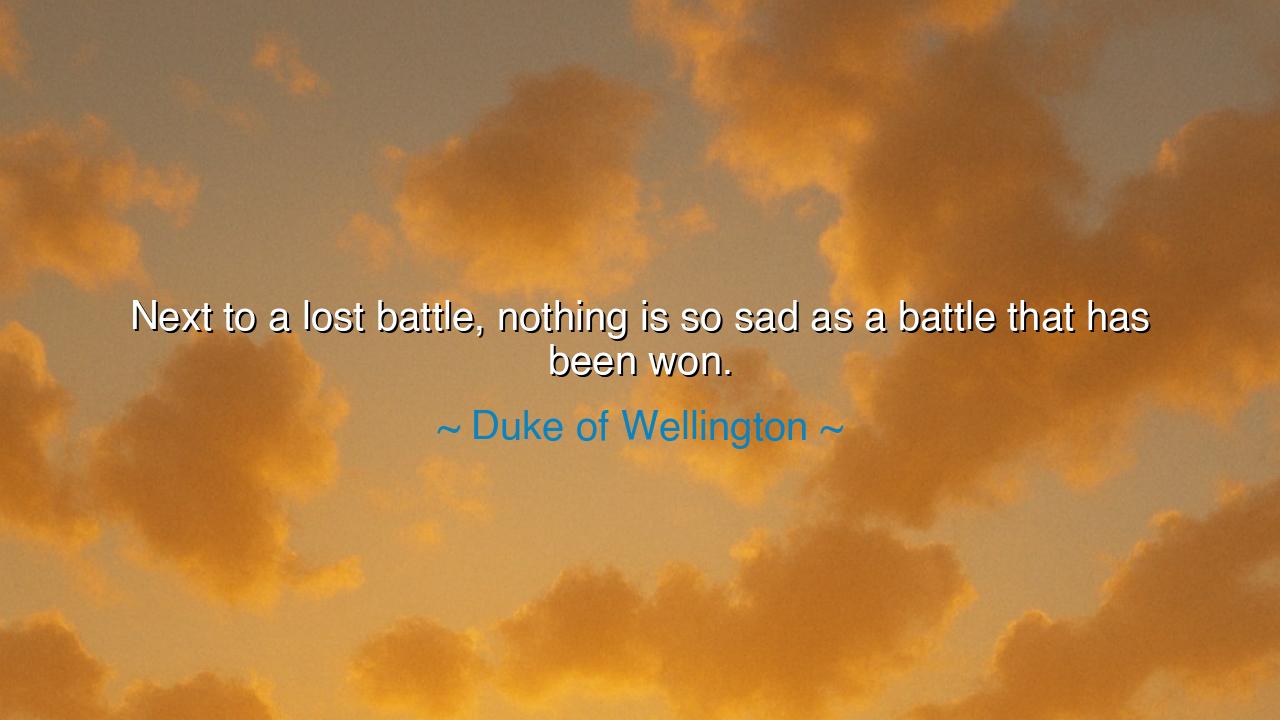
Next to a lost battle, nothing is so sad as a battle that has






In the somber and immortal words of the Duke of Wellington, victor of Waterloo, we are given a glimpse into the tragic wisdom of a soldier’s soul: “Next to a lost battle, nothing is so sad as a battle that has been won.” These words, spoken by the man who defeated Napoleon Bonaparte, are not the boast of a conqueror, but the lament of one who has looked upon the face of war and found no glory there. In them, we hear not triumph, but sorrow — the grief of victory purchased with blood. For Wellington, the end of battle did not bring joy, but silence, and in that silence he saw the terrible truth: that even victory carries the shadow of loss.
The origin of this quote lies in the aftermath of the Battle of Waterloo in 1815 — one of the most decisive and brutal conflicts in European history. Wellington had achieved what many thought impossible: he had ended the reign of Napoleon, whose armies had reshaped a continent. Yet when the cannons fell silent, he did not celebrate. He walked among the fields where thousands lay dead — men from both sides, many no older than boys. The smell of smoke and death hung over the rain-soaked soil, and the cries of the wounded pierced the wind. When asked about his feelings, Wellington uttered these haunting words, knowing that the price of victory was almost indistinguishable from the cost of defeat.
This sentiment is one the ancients would have understood well. The Greek historian Herodotus wrote that after the fall of Troy, the victors wept for the conquered, realizing that the triumph of war is fleeting, but its suffering endures. Even Alexander the Great, after conquering Persia, sat alone in his tent and wept — not only for the men he had lost, but for the emptiness that victory left behind. For those who have seen battle, it is clear that no one truly wins in war; there are only survivors and memories. To conquer is not to rejoice, but to mourn the ruin that victory leaves behind.
In Wellington’s reflection, we find not only the sorrow of war, but the eternal paradox of human ambition. To achieve great things often demands great sacrifice. Whether in war, politics, or the struggles of daily life, the cost of triumph is seldom seen by those who seek it — it is only revealed once it has been paid. The general’s words remind us that success without compassion, victory without conscience, is hollow. Even in our personal battles — those against hardship, injustice, or fear — we must remember that triumph achieved through destruction or pride leaves a wound that time cannot heal.
Consider the example of Abraham Lincoln at the end of the American Civil War. When the Union armies finally triumphed, he did not exult. Instead, he spoke of reconciliation and mercy, saying, “With malice toward none, with charity for all.” He, too, had seen what Wellington saw — that the field of victory is soaked in sorrow, and that a nation cannot truly win by humiliating its defeated. His compassion preserved the soul of his country, proving that true victory is not found in domination, but in healing.
Wellington’s words, though born in war, speak to all who strive, compete, or lead. They remind us that in every contest, whether of nations or of hearts, we must not lose sight of our shared humanity. The spoils of victory — wealth, fame, success — mean little if they are purchased at the cost of one’s soul. The wise understand that every triumph carries a burden: the memory of what was lost to achieve it. Thus, the noblest conqueror is not the one who celebrates loudly, but the one who bows his head in silence, humbled by the price of what he has gained.
The lesson of this quote, then, is both grave and luminous: seek not the kind of victory that leaves the world poorer. Let your triumphs be those that uplift, not destroy. When you fight, fight only for what is just. When you win, do not gloat, but give thanks. And when you lose, do not despair — for often the wisdom gained from loss is purer than the pride found in conquest.
In the end, the Duke of Wellington’s sorrow becomes a warning to all generations: that glory fades, but compassion endures. Let us, then, remember the cost of every victory, and let every triumph be tempered by humility. For the greatest battles are not fought with weapons, but within the heart — and the truest victory is to rise from struggle with one’s humanity intact. Thus, when history asks us what we won, let it be said not that we conquered others, but that we conquered ourselves — and found, in mercy, a peace that no battle can destroy.






AAdministratorAdministrator
Welcome, honored guests. Please leave a comment, we will respond soon